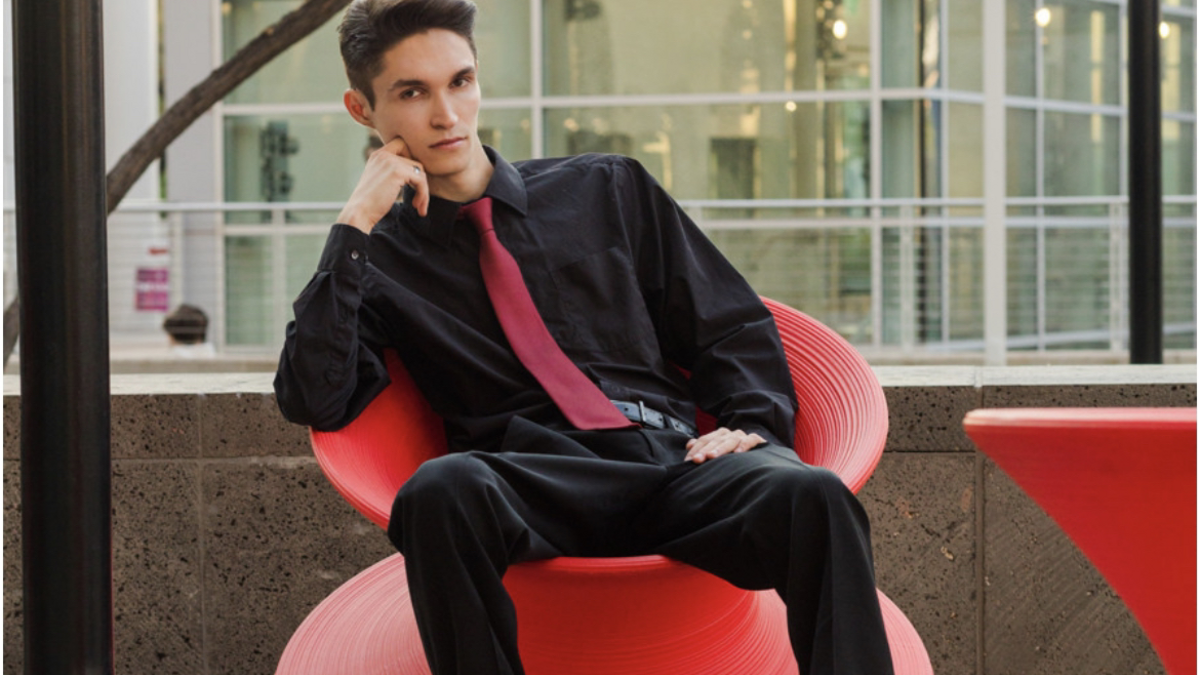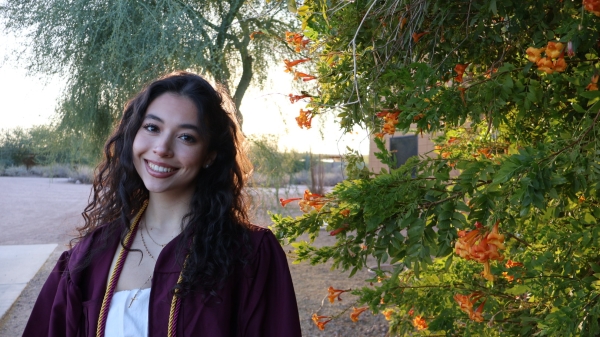Grad turns passion for video games, music into career

Evan Koutsogiannis. Photo courtesy Joni Harding
Editor’s note: This story is part of a series of profiles of notable fall 2023 graduates.
Evan Koutsogiannis’ passion for music and video games started at a young age.
“When I was a kid, I would get up early in the morning to do my homework, and I would have a PlayStation video game like 'Sonic the Hedgehog' running in the background so I could enjoy the music at different parts of the game,” he said. “As I got older and my passion for music developed through saxophone and jazz performance, I started composing music on my computer with tracking programs. I also began exploring who the composers were — like Koji Kondo, Simon Viklund, Ajurika and Tim and Jeff Follin.”
Koutsogiannis was 15 years old when he started working on his first collaborative project composing music for media for a group based in Venezuela.
“I commented on a video they posted asking if they needed a composer in Spanish and shared my music,” he said, “and we started working on the project.”
Koutsogiannis, who will receive a Bachelor of Arts in media arts and sciences with a focus in music from the School of Arts, Media and Engineering and a minor in Mandarin Chinese this fall, said he is excited to take the next step in his career and credits his work with ASU’s Meteor Studio for helping develop his skills.
He said Meteor Studio Director Robert LiKamWa, who is an associate professor in the School of Arts, Media and Engineering and in the School of Electrical, Computer and Energy Engineering, knew about his work and asked him if he was interested in joining the Meteor Studio, which explores, studies and advances mobile computing technologies at the intersection of technical advancement and usefulness/practicality, especially as they relate to mobile AR/VR/vision computing systems, and their ability to help people tell their stories.
“Professor LiKamWa told me that he was interested in my passion for composing music for video games, television and movies,” Koutsogiannis said. “He shared information with me about Meteor Studio — a lab he runs on campus — and how it could help develop my skill set and lead to a career. I thank God for this opportunity, because it has been a wonderful year and a half working with Meteor Studio on projects that have utilized and helped build my skill set.”
Koutsogiannis said he is currently applying to several different job opportunities across the United States to work as a multimedia composer, Foley artist, an audio engineer or XR developer with a focus on audio.
“I'll be more than happy to go into any field that is audio related, with preference in composition,” he said. “I am excited to see where my competencies in these areas will take me.”
Here, Koutsogiannis talks more about his experience studying at ASU and his path forward.
Question: What was your “aha” moment when you realized you wanted to study the field you majored in?
Answer: When I was 14 or 15 years old, I learned about the humoresque chord progression that starts in a minor key and sounds like there’s a temporary tonicization of a major key. I later discovered that this chord progression was used in the "Mega Man X4" soundtrack that I was studying and thought how amazing it was. From the melodies within the piece to the sound font they used, I was really awestruck. I shared my interest with my parents, and my mom, who is a musician, encouraged me to study music.
Q: What’s something you learned while at ASU — in the classroom or otherwise — that surprised you or changed your perspective?
A: It’s not about what you learn, it’s about how you apply what you know.
Q: Why did you choose ASU?
A: I feel like I was supposed to go to ASU for a reason. I was initially interested in a program at the University of California San Diego’s music school, but financially it wasn’t feasible. After discovering the digital culture program (now media arts and sciences), I realized this is what I wanted to do.
Q: Which professor taught you the most important lesson while at ASU?
A: Professor Garth Paine taught me how to reimagine music and sound as its own entity in the "concrete sonar." Paine taught me about acousmatic composition and learning to think about sounds that you hear as their own independent objects separate from what created them.
Q: What’s the best piece of advice you would give to students?
A: Trust God’s plan for your life. I had no idea what my college experience would look like, especially after COVID or during COVID even. I initially thought that college would look very different than how it occurred; but now, looking back, I'm very glad to say that I'm very happy with the way it turned out. It wasn't always easy, and at many times it was very hard both interpersonally, academically and in other areas as well, but He's got your back so I'm practicing that if you trust God, then it will all be right.
Q: What was your favorite spot on campus, whether for studying, meeting friends or just thinking about life?
A: During my freshman year, I began cultivating the habit of tuning into some stimulating ambient music and exploring the ASU campus through walking. I found great inspiration through the many spots on campus during the day and night. Since ASU has a combination of urban and naturally landscaped environments, it is very easy to find a new place while walking on campus to relax or stimulate the senses to inspire great work.
More Sun Devil community

Passion for human behavior drives first-gen student to major in psychology
Editor’s note: This story is part of a series of profiles of notable fall 2024 graduates.Natalie Motta is a driven and…

ASU grad turns interest in true-crime podcasts into passion for forensic psychology
Editor’s note: This story is part of a series of profiles of notable fall 2024 graduates.Kymberlin Quackenbush…

ASU grad combines academics, public service and entrepreneurship
Editor’s note: This story is part of a series of profiles of notable fall 2024 graduates.As a youngster, Javier Aguirre…